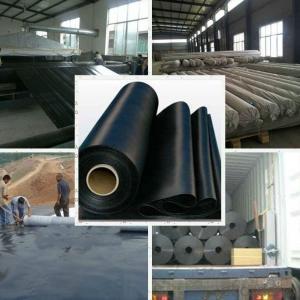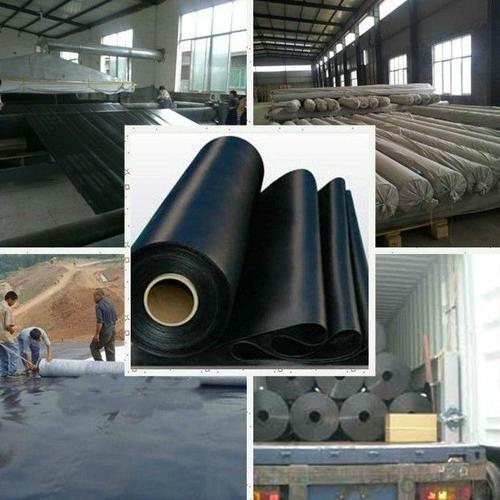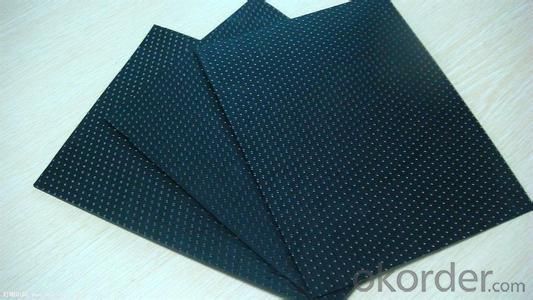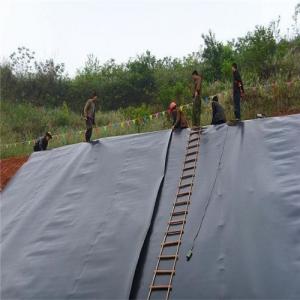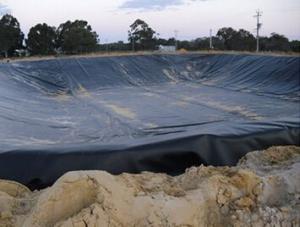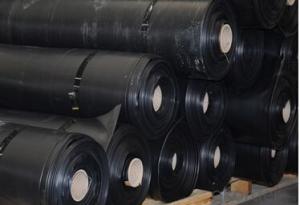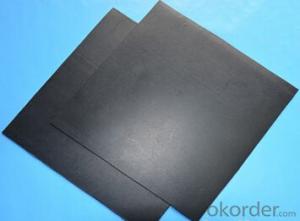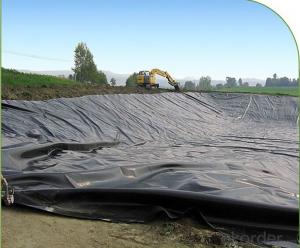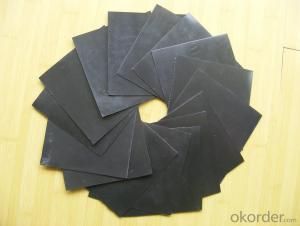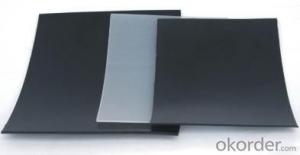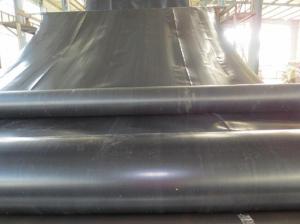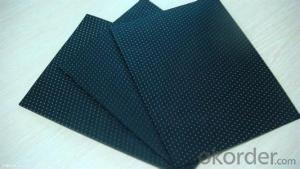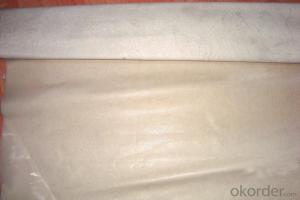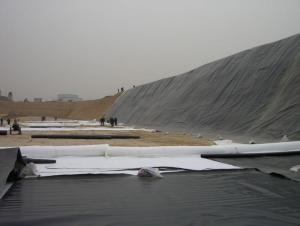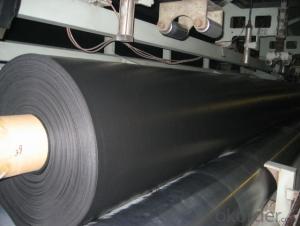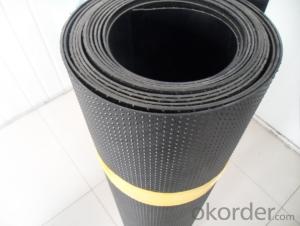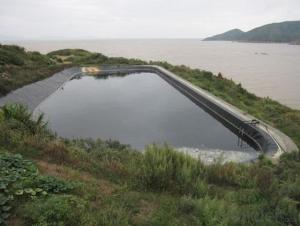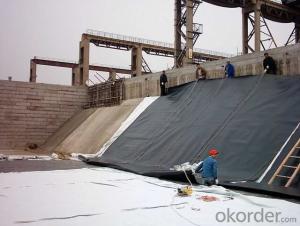Geomembrane China HDPE GH-I 1.0 Waterproof Board
- Loading Port:
- China Main Port
- Payment Terms:
- TT or LC
- Min Order Qty:
- -
- Supply Capability:
- -
OKorder Service Pledge
OKorder Financial Service
You Might Also Like
1.Product Description:
1) Environmental protection, sanitation (such as solid waste landfills, sewage treatment plants, power plants Chi-conditioning, industrial, hospital solid waste, etc.) .
2) Municipal Engineering (subway, on the ground floor of the building, planted roof, the roof garden of anti-seepage, sewage pipes lining, etc.).
3) Landscape (man-made lake, river, reservoir, golf courses reservoirs of the substrate, slope protection, green lawn of the waterproof
They are used in :
1.used in landfill caps
2. base liner applications under roads, railways,
3.secondary containment for above ground tank farms,
2.Qualifiedand Characteristc:
Our product was proved as good physical and mechanic performance, high tearing resistance, strong deformation adaptability, puncture,
aging, ultra-violet radiation, oil and salt, alkali and corrosion resistance, high and low temperature resistance, non-toxicity, long operational
life, good waterproof, drainage, anti-seepage and damp proof effects, complete width and thickness specifications, low cost and simple
construction.
3.Product Specifications:
1.Thickness : 1.0mm,
2.Length: 50 m -100 m ; width: 1 m -8 m ( according to customer needs )
3.Tensile elongation at break 600%
4.Material: HDPE.
5.Color: Black or as required
6.Product Packing:packed in rolls
4.Reference Picture
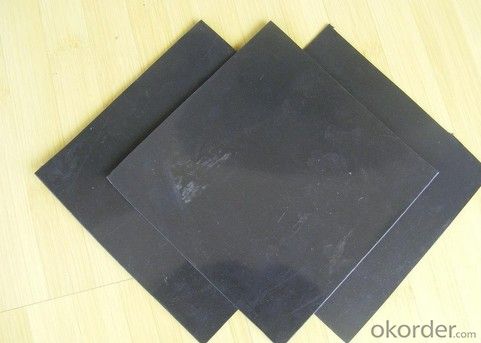
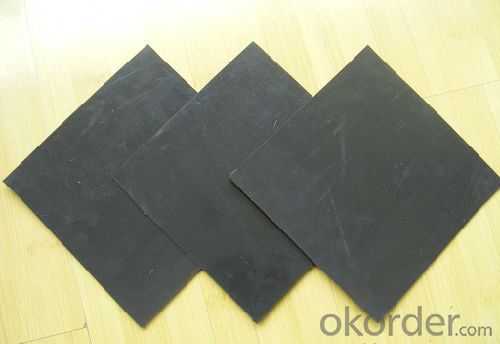
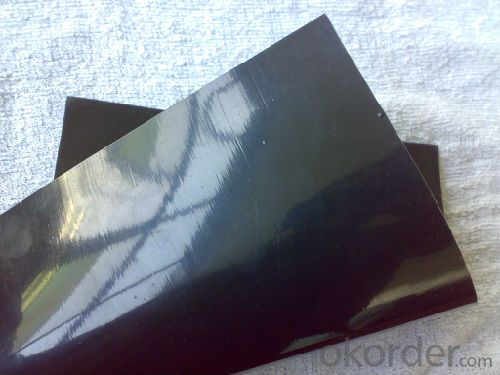
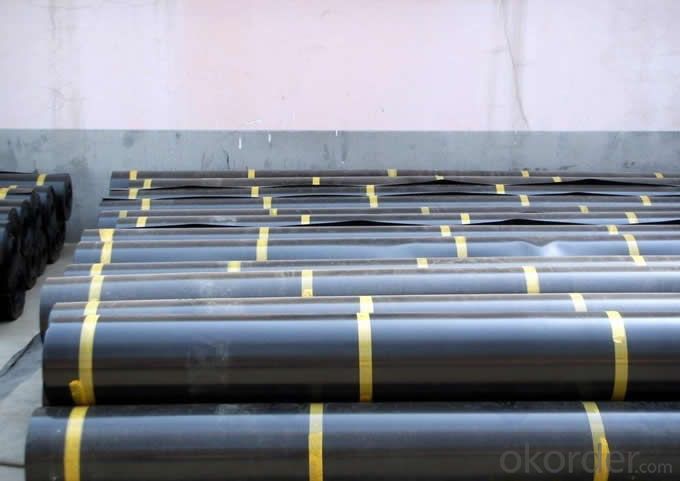
- Q: The service life period of geomembrane
- Because the composite geomembrane has oxidation resistance, some files in some companies extend the time limit the previous Soviet Union BCH07-74 "Notice for the earth-rockfill application of polyethylene dam seepage control structure" stipulates polyethylene geomembrane can be used for buildings with limit over 50 Ollie Linz company publish papers on polypropylene composite geo-membrane geotechnique composite material character, whose conclusion is: Polypropylene 15 on-site application experience shows that the compound has high stability; fabric damage construction; laying has no change;...... Expected to exceed 100 stability diagram"
- Q: How do geomembranes contribute to groundwater recharge?
- Geomembranes can contribute to groundwater recharge by acting as a barrier that prevents infiltration of surface contaminants and contaminants present in the soil, thus protecting the underlying groundwater from pollution and maintaining its quality. Additionally, geomembranes can be utilized as liners in reservoirs or ponds, preventing seepage and allowing for the storage and controlled release of water, which can ultimately enhance groundwater recharge.
- Q: Geomembrane sn2/ what does pe represent for?
- Represent for two cloths one membrane of PE material--composite geomembrane
- Q: What is the expected lifespan of a geomembrane in a wastewater treatment plant?
- The expected lifespan of a geomembrane in a wastewater treatment plant can vary depending on various factors such as the quality of the material, installation techniques, and maintenance practices. On average, a well-designed and properly maintained geomembrane can last anywhere from 20 to 30 years. However, with advancements in technology and the use of high-quality materials, some geomembranes have been known to last even longer, exceeding 30 years.
- Q: What is the difference between single-sided laminated film and double-sided laminated film of paper cups?
- Paper cups coated with single-sided laminated film are used to contain hot drinks while paper cups coated with double-sided laminated film contain cold drinks ( condensated water caused by the cold drinks added with ice cubes will soften the cup). Milky tea can be held in paper cups coated with single-sided laminated film. Paper cups can be divided into single-sided PE laminating paper cups and two sides?PE?coated?paper cups. Paper that is made of single-sided PE laminating paper is single sided PE laminating paper cup (most market cups and advertising cups in China is single sided PE laminating paper cup). There is smooth PE laminating film on the side of the cup that contacts with water. Paper cups that are made of double-sided PE laminating paper are double-sided PE laminating paper cups. The double-sided PE laminating paper cup has PE laminating paper on its both sides.
- Q: What are the considerations for geomembrane installations in areas with high snow loads?
- When considering geomembrane installations in areas with high snow loads, several key factors must be taken into account. Firstly, the design of the geomembrane system should be robust enough to withstand the weight and pressure exerted by the snow load. This may require thicker or reinforced geomembrane materials, as well as additional support structures such as geotextiles or geogrids. Secondly, proper site preparation is crucial. The installation area should be cleared of any debris or obstacles that could potentially damage the geomembrane or impede its performance under the snow load. Additionally, the site should be properly graded to ensure adequate drainage and prevent the formation of snow accumulations or ice dams that could put excessive pressure on the geomembrane. Another consideration is the choice of anchorage method. The geomembrane should be securely anchored to prevent any uplift or movement caused by snow accumulation or wind. This may involve using anchor trenches, ballast systems, or other appropriate anchoring techniques. Furthermore, the choice of geomembrane material should take into account its resistance to cold temperatures, freeze-thaw cycles, and potential damage caused by ice or snow removal activities. It is important to select a geomembrane material that can withstand the specific climatic conditions of the area and maintain its integrity throughout the winter season. Lastly, regular inspection and maintenance are essential for geomembrane installations in high snow load areas. Periodically checking for any signs of damage, such as tears, punctures, or stress points, and promptly addressing them can help prevent further deterioration and ensure the longevity of the geomembrane system. In summary, considerations for geomembrane installations in areas with high snow loads include robust design, proper site preparation, secure anchorage, selection of suitable geomembrane material, and regular inspection and maintenance.
- Q: Can PET film be used as thin film of the case sealing tape?
- It can not. PE tape is made from polyethylene and the film is soft and has low intensity, and it is commonly used in the field of protective film. PET tape, made from polyester and the film has high strength and good insulation performance, and it is commonly used in the insulation of electrical and electronic products.
- Q: What is the welding method of geotextile?
- It is easy to weld the geotextiles that manual rolling and paving is enough. The surface should be flat with some deformation allowance left. The long or short nonwoven geotextiles are often bonded by lapping, seaming and welding. The seamed and welded overlap is generally more than 0.1m wide. The lapped overlap is generally more than 0.2m wide. For geotextiles with long exposure time, methods of welding and seaming are recommended. Continue seaming until the all the work is completed. (disconnected seaming is not allowed.) Before being bonded, the overlaps should not be less than 150mm wide. The minimum distance of seams to the edges (the exposed edge of material) is 25mm. The thread for seaming should be made from resin with tensile strength no less than 60N, with chemical resistance and UV resistance that are the same with that of geotextile or exceed that of geotextile. Any "missed stitch" should be avoid. Actions should be taken accordingly to prevent emission of soil, particulate matters or foreign matters.
- Q: What is the difference between the basement membrane and varnish?
- So, it is simple to understand. It is a distinction of professionals and non-professionals. a
- Q: Can geomembranes be used in underground applications?
- Yes, geomembranes can be used in underground applications. They are often used in underground structures such as tunnels, landfills, and mining operations to prevent the leakage of liquids or gases. Geomembranes provide an impermeable barrier that helps protect the environment and enhance the durability and safety of underground projects.
Send your message to us
Geomembrane China HDPE GH-I 1.0 Waterproof Board
- Loading Port:
- China Main Port
- Payment Terms:
- TT or LC
- Min Order Qty:
- -
- Supply Capability:
- -
OKorder Service Pledge
OKorder Financial Service
Similar products
Hot products
Hot Searches
Related keywords
